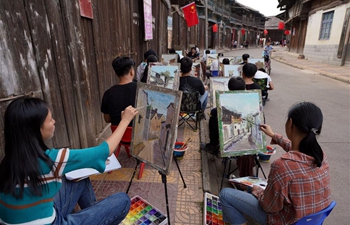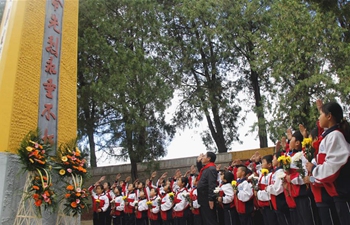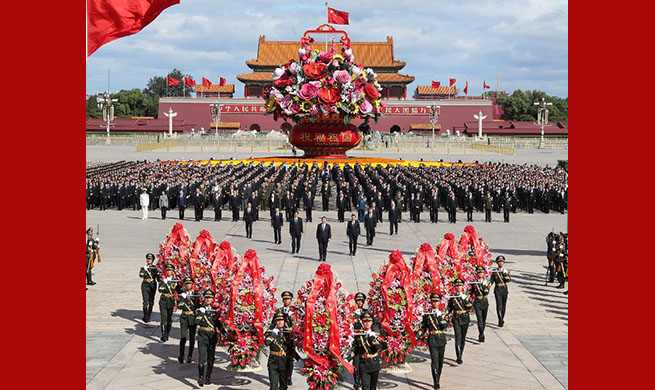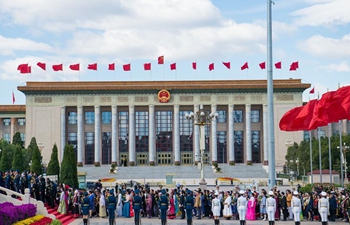by Abu Hanifah
PALU, Indonesia, Oct. 1 (Xinhua) -- Survivors of the multiple earthquakes and an ensuing tsunami in Palu, capital of Indonesia's Central Sulawesi province, were having the most difficult time in their lives.
Living in tents with extremely limited supplies, they even needed to watch out for looters and remained vigilant amid helplessness and poor health condition.
Xinhua reporters on Monday afternoon witnessed chaos in Toweli camp, some 18 km from downtown tsunami-hit Palu. Several female survivors screamed and cried out loud as men tried to chase several looters on the street.
A survivor in the camp told Xinhua that the looters tried to provoke others to run up the hill behind the camp following a mild aftershock that occurred earlier in the day.
"They kept shouting rising water and rising water, all the way to this camp which made some of us believe it and run up to the hill."
"We are very scared every time we recall the tsunami. But some of us remained alert on the looters' bogus trick to make us leave our belongings in the camp," Munajat Rifai, in his 40s, told Xinhua in his makeshift tent in Toweli camp.
Munajat, who camped in Toweli with his relatives' five families, said the screaming female survivors were the ones who are in deep trauma as they witnessed the deadly tsunami wave with their own eyes.
"They could cry suddenly to recall the chilling event. They could cry like crazy when they heard the looters' tricks to make us leave the camp," Munajat said.
"They already tried that several times here. It must be stopped."
Munajat said his children also had deep mental trauma, as they cried every time they heard any noise that scared them.
Strong and shallow quakes of 6.0, 7.4 and 6.1 magnitude that triggered a tsunami devastated the central province on Friday with the hardest-hit area in Palu and adjoining Donggala district.
The tsunami with the height of 0.5 to 3 meters ravaged coastal areas near Talise beach in Palu and Donggala district.
Over 1,203 people were confirmed dead so far, according to the Disaster Management Institute of Indonesia, Care for Humanity and the Humanity Data Center.
Munajat said the lack of food and other supplies made youths and children loot mini markets in the neighborhood.
"Even it is understandable due to our situation here without any aids delivered by the authorities. I am very sad to see that. Our youths became savage in their attitude in the last several days and we had never saw this before," Munajat said.
He called on the government to deliver relief supplies especially clean and drinking water.
The camp in Toweli was inhabited by at least 200 people from five villages in Toweli district. A tent used by a family was equipped with a generator that helped the survivors keep updated with the latest information.
Palu remained totally dark at night as power supplies were cut off after the tsunami. The only light came from passing cars and motorbikes and lamps of houses equipped with their own generators.
The stench of dead bodies was intense around Palu's iconic Talise Beach, a popular tourism spot, hit by the tsunami. Debris of trees, collapsed buildings, cars, motorbikes and trucks rolled over by the tsunami remained scattered. Boats beached by the tsunami were also seen in many parts of the beach.
Cars and motorbikes swarmed in the gas station which just resumed its fuel supply earlier on Monday. They waited in a very long line to have their vehicle tanks filled up.
A military search team member told Xinhua on Monday night that the search was still underway, focusing on the hills opposite the beach, as many bodies were believed to be swept there by the tsunami.
Authorities were yet to gain sufficient information from Donggala, as telecommunication system and access to the district remained paralyzed.
Reports said some 200 bodies were buried in a mass grave yard at East Palu cemetery of Poboya Indah earlier on Monday. The bodies were the ones that failed to be identified, after being kept in hospital for almost four days.
Indonesian Vice President Jusuf Kalla said earlier that the death toll may reach thousands, given the deadly impact of the disaster.
The United Nations Office for the Coordination of Humanitarian Affairs said Monday that a total of 191,000 people in affected areas are in urgent need of humanitarian assistance.
The disasters also seriously injured 540 people and forced 16,732 people to flee homes, according to the National Disaster Management Agency.













